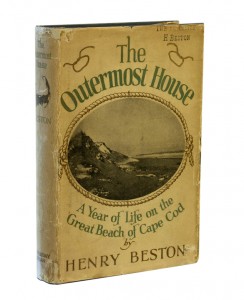 “We need another and a wiser and perhaps a more mystical concept of animals,” Henry Beston wrote in his 1928 classic, The Outermost House. “For the animal shall not be measured by man. In a world older and more complete than ours, they move finished and complete, gifted with extensions of the senses we have lost or never attained, living by voices we shall never hear.”
“We need another and a wiser and perhaps a more mystical concept of animals,” Henry Beston wrote in his 1928 classic, The Outermost House. “For the animal shall not be measured by man. In a world older and more complete than ours, they move finished and complete, gifted with extensions of the senses we have lost or never attained, living by voices we shall never hear.”
His words have guided my writing life for the past 30 years.
Beston’s insights were not only profound but prescient. More than fifty years after he wrote this passage, science has documented whole worlds of sensation we cannot perceive. Elephants and fin whales communicate over vast distances with infrasonic calls. Bees see polarized light; spiders and insects see ultraviolet; bats and dolphins probe their world with sonar. Octopuses taste with their skin.
Much of my work as a science writer and author has been spent considering these wonders. The discoveries about animals’ powers expand our consciousness, opening up to us the equally real, equally rich, and equally valuable sensory worlds that exist parallel to our own.
Beston, of course, did not know about these scientific breakthroughs in the 1920s, but it is possible he could have envisioned them. Watching the migrations of the alewives, listening to the “harsh tenderness” in the cries of the common terns, Beston brought to his observations of the natural world all of his talents—not just his intellect, but his emotion and intuition as well. His book is, to me, a blueprint for how to open your soul to creation, how to see animals in a new, humbling, and revelatory way. “They are not brethren, they are not underlings,” he wrote. “They are other nations, caught with ourselves in the net of life and time, fellow prisoners of the splendour and travail of the earth.”

